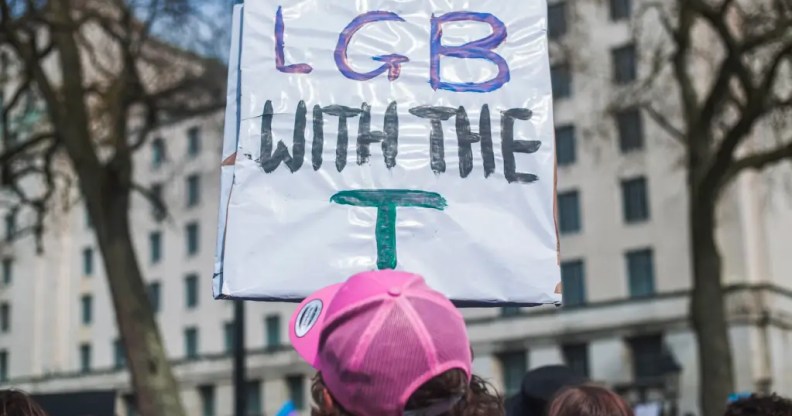Labour peer expertly explains why blocking Scotland’s gender bill is completely unjustified

The block was swiftly criticised by numerous figures (Unsplash)
Labour peer Lord Charlie Falconer has explained perfectly why there are no valid reasons to block Scotland’s gender reform bill.
Among other measures, the bill would have made it easier for trans people to obtain a gender-recognition certificate – used to change legal sex on birth, marriage and death certificates – by removing the requirement for a medical diagnosis and lowering the age limit to 16.
The secretary of state for Scotland, Alister Jack, announced on Monday (16 January) that the government will invoke Section 35 of the Scotland Act to stop the country’s gender-recognition reforms from going forward for royal assent.
Lord Falconer, who was lord high chancellor between 2003 and 2007, then secretary of state for justice, outlined three clear reasons why Jack’s belief that the bill will have an “adverse effect” on things such as equal opportunities is simply unjustified.
In a string of Tweets, Lord Falconer debunked the idea that the new Scotland GRC would come with “administrative difficulties” saying that the impact would be minimal and Section 35 couldn’t “reasonably be triggered.”
‘The Statement of Reasons does not justify the use of [Section] 35’
He said: “The administrative difficulties obviously have to be balanced against the benefits to be obtained to the trans community in having much easier access to GRCs… the country with the closest system to the GRR has an average of 550 per year. Even taking the figure of 550, the administrative difficulties are minimal.
“In any event, the nuclear option of [Section] 35 couldn’t reasonably be triggered by the administrative inconvenience.”
Scotland’s first minister, Nicola Sturgeon, described Lord Falconer’s thread as “well worth a read”, doubling down on his point that the imposition of Section 35 is not justified.
The second point Falconer covered was that there would be a higher risk of “fraudulent” applications.
He went on to say that the more applicants for a GRC there were, would result in a “vast majority” being genuine. “The second category of adverse effects in the statement of reasons is said to be increased risk of fraudulent applications. The process is easier so the risk of fraudulent or malign applications is increased.
“But in the context of 525 additional applications, the vast majority of those are likely to be genuine.
“The authorities can monitor applications and the chief constable is able to inform the Registrar General of any person in respect of who they make a sexual protection order application, so the RG will not grant them a GRC, the risk of fraud does not possibly justify [Section 35].”
The final reason Falconer debunked centred on justifying the block due to a potential to affect the “operation” of the 2010 Equality Act.
“Already associations such as those which provide support for women victims of sexual violence would be guilty of gender-assignment discrimination if they refused membership to a biological man with GRC making her legally a woman,” Falconer said.
“The Statement of Reasons does not justify the use of [Section] 35.”
How did this story make you feel?

